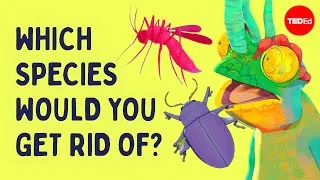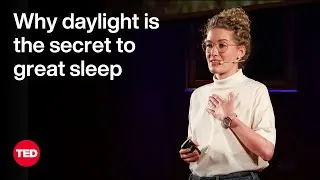請雙擊下方英文字幕播放視頻。
譯者: Joan Liu
審譯者: Resa CC
00:15
What I want to talk to you about
0
15260
3000
我想要談的是
00:18
is what we can learn from studying the genomes
1
18260
2000
我們從研究
00:20
of living people
2
20260
2000
活著的人
00:22
and extinct humans.
3
22260
2000
和滅絕人種的基因組中可以學到什麼。
00:24
But before doing that,
4
24260
2000
但在那之前,
00:26
I just briefly want to remind you about what you already know:
5
26260
3000
我要提醒你們一些你們已經知道的事:
00:29
that our genomes, our genetic material,
6
29260
2000
我們的基因組,我們的基因物質,
00:31
are stored in almost all cells in our bodies in chromosomes
7
31260
3000
存在於我們身上幾乎所有細胞內的染色體中,
00:34
in the form of DNA,
8
34260
2000
以DNA的形式存在,
00:36
which is this famous double-helical molecule.
9
36260
3000
即著名的雙重螺旋分子結構。
00:39
And the genetic information
10
39260
2000
而且這些基因資料
00:41
is contained in the form of a sequence
11
41260
2000
是以四種簡稱為
00:43
of four bases
12
43260
2000
A、T、C、G的鹼基
00:45
abbreviated with the letters A, T, C and G.
13
45260
3000
組成的序列。
00:48
And the information is there twice --
14
48260
2000
基因資料有兩組──
00:50
one on each strand --
15
50260
2000
一股(線)上一組──
00:52
which is important,
16
52260
2000
這點很重要,
00:54
because when new cells are formed, these strands come apart,
17
54260
2000
因為當新細胞形成時,DNA的雙股會分開,
00:56
new strands are synthesized with the old ones as templates
18
56260
3000
單股各自為模板,與(複製出的)新股合成為兩條雙股DNA
00:59
in an almost perfect process.
19
59260
3000
這是一個近乎完美的複製過程。
01:02
But nothing, of course, in nature
20
62260
2000
當然!自然界沒有任何東西
01:04
is totally perfect,
21
64260
2000
是完美無瑕的。
01:06
so sometimes an error is made
22
66260
2000
因此有時會出錯而
01:08
and a wrong letter is built in.
23
68260
3000
置入錯誤的字母(鹼基)。
01:11
And we can then see the result
24
71260
2000
舉例來說,當我們比較
01:13
of such mutations
25
73260
2000
演說廳內所有人的DNA序列,
01:15
when we compare DNA sequences
26
75260
2000
我們就會看到
01:17
among us here in the room, for example.
27
77260
3000
這類突變的結果。
01:20
If we compare my genome to the genome of you,
28
80260
3000
拿我的基因組跟你們的比較,
01:23
approximately every 1,200, 1,300 letters
29
83260
4000
在我們之中,大約每1,200或1,300個鹼基
01:27
will differ between us.
30
87260
2000
就會出現不同之處。
01:29
And these mutations accumulate
31
89260
2000
而且這些突變
01:31
approximately as a function of time.
32
91260
3000
有大概的週期,隨歲月不斷積累。
01:34
So if we add in a chimpanzee here, we will see more differences.
33
94260
3000
所以若加入黑猩猩來比對,差異又更大了。
01:37
Approximately one letter in a hundred
34
97260
3000
大約每一百個字母(鹼基)就有一個
01:40
will differ from a chimpanzee.
35
100260
2000
跟大猩猩不同。
01:42
And if you're then interested in the history
36
102260
2000
而且若你對一段DNA
01:44
of a piece of DNA, or the whole genome,
37
104260
2000
或是整個基因組的進化史有興趣的話,
01:46
you can reconstruct the history of the DNA
38
106260
3000
可以利用這些觀測到的差異
01:49
with those differences you observe.
39
109260
2000
來重現DNA的進化史。
01:51
And generally we depict our ideas about this history
40
111260
4000
一般我們以這樣的樹狀圖
01:55
in the form of trees like this.
41
115260
2000
來繪製我們對進化史的概念。
01:57
In this case, it's very simple.
42
117260
2000
以這個例子來說,就是個簡單的例子。
01:59
The two human DNA sequences
43
119260
2000
這兩個人類DNA序列
02:01
go back to a common ancestor quite recently.
44
121260
3000
可追溯到最近的同源祖先。
02:04
Farther back is there one shared with chimpanzees.
45
124260
4000
時間再往回推,就可推出和黑猩猩有同源祖先。
02:08
And because these mutations
46
128260
3000
而且因為這些突變的發生
02:11
happen approximately as a function of time,
47
131260
2000
可依時間作大概推算,
02:13
you can transform these differences
48
133260
2000
你們可以把這些差異
02:15
to estimates of time,
49
135260
2000
轉換成估算的時間,
02:17
where the two humans, typically,
50
137260
2000
一般而論,這兩個人類
02:19
will share a common ancestor about half a million years ago,
51
139260
4000
可被推算出在大約五十萬年前有同源祖先,
02:23
and with the chimpanzees,
52
143260
2000
跟黑猩猩的話,
02:25
it will be in the order of five million years ago.
53
145260
3000
推算出的時間是在五百萬年前左右。
02:28
So what has now happened in the last few years
54
148260
2000
這麼說吧,這些年來發生的事──
02:30
is that there are account technologies around
55
150260
2000
精密科技的問世
02:32
that allow you to see many, many pieces of DNA very quickly.
56
152260
4000
讓我們得以非常快速地檢視很多、很多的DNA。
02:36
So we can now, in a matter of hours,
57
156260
2000
所以僅僅幾個小時,我們就可以
02:38
determine a whole human genome.
58
158260
3000
檢測出全套人類基因組。
02:41
Each of us, of course, contains two human genomes --
59
161260
3000
當然人類每個個體都有兩組基因組:
02:44
one from our mothers and one from our fathers.
60
164260
3000
一組來自母親,一組來自父親。
02:47
And they are around three billion such letters long.
61
167260
4000
而且約三十億字母(鹼基)的長度。
02:51
And we will find that the two genomes in me,
62
171260
2000
大家會在我身上找到兩組基因組,
02:53
or one genome of mine we want to use,
63
173260
2000
我們拿其中一組基因組來檢驗,
02:55
will have about three million differences
64
175260
3000
約有三百萬不同之處
02:58
in the order of that.
65
178260
2000
大概是這個數字。
03:00
And what you can then also begin to do
66
180260
2000
然後你也可以開始研究
03:02
is to say, "How are these genetic differences
67
182260
2000
這些基因的差異
03:04
distributed across the world?"
68
184260
2000
在這世界的分佈情形。
03:06
And if you do that,
69
186260
2000
而且若這麼做,
03:08
you find a certain amount of genetic variation in Africa.
70
188260
4000
你會發現在非洲有某一數量的基因變異(突變)。
03:12
And if you look outside Africa,
71
192260
3000
若你研究非洲以外的地區,
03:15
you actually find less genetic variation.
72
195260
3000
你觀察到的基因變異較少。
03:18
This is surprising, of course,
73
198260
2000
奇怪吧!
03:20
because in the order of six to eight times fewer people
74
200260
3000
因為在非洲的人比在非洲外的人
03:23
live in Africa than outside Africa.
75
203260
3000
少了約七、八倍。
03:26
Yet the people inside Africa
76
206260
3000
然而非洲內的人
03:29
have more genetic variation.
77
209260
3000
發生更多的基因變異(突變)
03:32
Moreover, almost all these genetic variants
78
212260
2000
況且,我們在非洲外發現
03:34
we see outside Africa
79
214260
2000
幾乎所有基因變異
03:36
have closely related DNA sequences
80
216260
2000
與在非洲內找到的DNA序列
03:38
that you find inside Africa.
81
218260
2000
有密切關係。
03:40
But if you look in Africa,
82
220260
2000
但若你們看看非洲內,
03:42
there is a component of the genetic variation
83
222260
3000
有處基因變異
03:45
that has no close relatives outside.
84
225260
3000
在非洲外完全沒有相近的排列。
03:48
So a model to explain this
85
228260
3000
那麼可以解釋這個的模式是
03:51
is that a part of the African variation, but not all of it,
86
231260
3000
部分基因變異的非洲人,而非全基因變異人口,
03:54
[has] gone out and colonized the rest of the world.
87
234260
4000
移居到地球其他地方。
03:58
And together with the methods to date these genetic differences,
88
238260
4000
再加上利用基因差異斷定時間的技術,
04:02
this has led to the insight
89
242260
2000
讓我們對現代人類
04:04
that modern humans --
90
244260
2000
有這樣的了解:
04:06
humans that are essentially indistinguishable from you and me --
91
246260
3000
根本上難分你我的人類
04:09
evolved in Africa, quite recently,
92
249260
3000
是最近約十萬至二十萬年前
04:12
between 100 and 200,000 years ago.
93
252260
4000
在非洲進化而來的。
04:16
And later, between 100 and 50,000 years ago or so,
94
256260
4000
稍後約五萬到十萬年前
04:20
went out of Africa
95
260260
2000
離開非洲
04:22
to colonize the rest of the world.
96
262260
2000
到世界其他地方殖民。
04:24
So what I often like to say
97
264260
2000
所以我常喜歡說
04:26
is that, from a genomic perspective,
98
266260
2000
以基因組的觀點來看,
04:28
we are all Africans.
99
268260
2000
我們都是非洲人。
04:30
We either live inside Africa today,
100
270260
3000
我們不是現今住在非洲內
04:33
or in quite recent exile.
101
273260
2000
就是最近出走非洲的那群。
04:35
Another consequence
102
275260
2000
另一個現代人類的
04:37
of this recent origin of modern humans
103
277260
3000
最近起源的推論是
04:40
is that genetic variants
104
280260
2000
基因變異
04:42
are generally distributed widely in the world,
105
282260
2000
廣泛地分佈在全球
04:44
in many places,
106
284260
2000
各個地方,
04:46
and they tend to vary as gradients,
107
286260
3000
而且以全版面的角度來看
04:49
from a bird's-eye perspective at least.
108
289260
4000
往往呈梯度變化。
04:53
And since there are many genetic variants,
109
293260
2000
由於有很多基因變異,
04:55
and they have different such gradients,
110
295260
3000
就有不同的梯度變化,
04:58
this means that if we determine a DNA sequence --
111
298260
3000
這意味著若我們可以測出DNA序列──
05:01
a genome from one individual --
112
301260
3000
個體的基因組──
05:04
we can quite accurately estimate
113
304260
2000
我們可以相當準確地判斷
05:06
where that person comes from,
114
306260
2000
這個人是從哪裡來的,
05:08
provided that its parents or grandparents
115
308260
2000
若其父母或祖父母
05:10
haven't moved around too much.
116
310260
3000
沒有經常四處遷徙。
05:13
But does this then mean,
117
313260
2000
但這是不是表示
05:15
as many people tend to think,
118
315260
2000
如很多人想的那樣
05:17
that there are huge genetic differences between groups of people --
119
317260
3000
不同族群的人,基因差異很大,
05:20
on different continents, for example?
120
320260
2000
是不是不同洲的人差異會更大?
05:22
Well we can begin to ask those questions also.
121
322260
3000
嗯,我們也可以開始問這樣的問題。
05:25
There is, for example, a project that's underway
122
325260
3000
舉個例子,有個計畫在執行中
05:28
to sequence a thousand individuals --
123
328260
2000
要為世界不同地方的一千個人
05:30
their genomes -- from different parts of the world.
124
330260
3000
排列基因組。
05:33
They've sequenced 185 Africans
125
333260
3000
研究人員已經在非洲兩個族群中
05:36
from two populations in Africa.
126
336260
3000
完成185個人的DNA序列。
05:39
[They've] sequenced approximately equally [as] many people
127
339260
3000
在歐洲和在中國已排出序列的
05:42
in Europe and in China.
128
342260
3000
人數也大概同樣多。
05:45
And we can begin to say how much variance do we find,
129
345260
3000
那麼我們便可開始指出找到多少基因變異,
05:48
how many letters that vary
130
348260
3000
在這些個體DNA排序中,
05:51
in at least one of those individual sequences.
131
351260
3000
單一個人的鹼基有多少變化。
05:54
And it's a lot: 38 million variable positions.
132
354260
4000
答案是很多:有三千八百萬個變異處。
05:58
But we can then ask: Are there any absolute differences
133
358260
3000
但我們也可以問:非洲人和非非洲人
06:01
between Africans and non-Africans?
134
361260
2000
有任何完全差異嗎?
06:03
Perhaps the biggest difference
135
363260
2000
也許我們大部份的人會想到的
06:05
most of us would imagine existed.
136
365260
2000
最大差異曾經存在過。
06:07
And with absolute difference --
137
367260
2000
而「完全差異」
06:09
and I mean a difference
138
369260
2000
我所指的差異是
06:11
where people inside Africa at a certain position,
139
371260
3000
非洲內的人在某個「特定位置」,
06:14
where all individuals -- 100 percent -- have one letter,
140
374260
3000
「百分之百」有「相同的字母(鹼基)」,
06:17
and everybody outside Africa has another letter.
141
377260
4000
而每個在非洲外的人則有「另一個字母(鹼基)」。
06:21
And the answer to that, among those millions of differences,
142
381260
3000
這個問題的答案是,數百萬的差異之中,
06:24
is that there is not a single such position.
143
384260
3000
沒有這樣一個「完全差異」的位置。
06:29
This may be surprising.
144
389260
2000
這也許出人意料。
06:31
Maybe a single individual is misclassified or so.
145
391260
3000
也許有某個人的序列被弄錯了。
06:34
So we can relax the criterion a bit
146
394260
2000
所以我們可以稍稍放寬條件來問:
06:36
and say: How many positions do we find
147
396260
2000
我們發現有多少位置是
06:38
where 95 percent of people in Africa have
148
398260
2000
95%非洲內的人
06:40
one variant,
149
400260
2000
有「相同變異」,
06:42
95 percent another variant,
150
402260
2000
而在同樣的位置,95%非洲境外人則有「另一變異」,
06:44
and the number of that is 12.
151
404260
2000
得到的數字是12。
06:46
So this is very surprising.
152
406260
2000
所以很意外吧
06:48
It means that when we look at people
153
408260
2000
這意味著當我們看著人群,
06:50
and see a person from Africa
154
410260
3000
看到某個來自非洲的人、
06:53
and a person from Europe or Asia,
155
413260
3000
看到某個來自歐洲或亞州的人,
06:56
we cannot, for a single position in the genome with 100 percent accuracy,
156
416260
4000
我們不能百分之百說中
07:00
predict what the person would carry.
157
420260
2000
「某人」基因組之「某處」具有「何種鹼基」。
07:02
And only for 12 positions
158
422260
2000
而且只有12個位置
07:04
can we hope to be 95 percent right.
159
424260
4000
我們能期望有九成五的正確率。
07:08
This may be surprising,
160
428260
2000
這也許令人驚訝。
07:10
because we can, of course, look at these people
161
430260
2000
我們當然可以用肉眼盯著這些人
07:12
and quite easily say where they or their ancestors came from.
162
432260
4000
並相當容易地分辨他們或其祖先從哪裡來。
07:16
So what this means now
163
436260
2000
也就是說
07:18
is that those traits we then look at
164
438260
2000
我們看到的這些特徵
07:20
and so readily see --
165
440260
2000
是很容易就看得到的──
07:22
facial features, skin color, hair structure --
166
442260
3000
相貌特色、髮色質量、皮膚顏色──
07:25
are not determined by single genes with big effects,
167
445260
4000
並非由各類單一、重要的基因決定其作用,
07:29
but are determined by many different genetic variants
168
449260
3000
而是由很多不同的基因變異決定,
07:32
that seem to vary in frequency
169
452260
2000
且這些變異似乎在世界各地
07:34
between different parts of the world.
170
454260
2000
發生的頻率(次數)也不同。
07:36
There is another thing with those traits
171
456260
3000
另外一件事與我們可以很容易地
07:39
that we so easily observe in each other
172
459260
3000
在彼此身上看得到的特徵有關。
07:42
that I think is worthwhile to consider,
173
462260
2000
我認為值得想想,
07:44
and that is that, in a very literal sense,
174
464260
3000
就字義來說,
07:47
they're really on the surface of our bodies.
175
467260
3000
這些特徵的確是在我們身體表面。
07:50
They are what we just said --
176
470260
2000
如我剛剛說的
07:52
facial features, hair structure, skin color.
177
472260
3000
相貌特色、髮色質量、皮膚顏色。
07:55
There are also a number of features
178
475260
2000
然而各洲間還存有諸如此類的不同特色
07:57
that vary between continents like that
179
477260
2000
可說是不勝枚舉,
07:59
that have to do with how we metabolize food that we ingest,
180
479260
4000
像是我們如何代謝我們吃進去的食物
08:03
or that have to do
181
483260
2000
或是
08:05
with how our immune systems deal with microbes
182
485260
3000
我們的免疫系統如何應付
08:08
that try to invade our bodies.
183
488260
2000
企圖侵犯我們身體的病菌。
08:10
But so those are all parts of our bodies
184
490260
2000
然而這些是我們身體的各部
08:12
where we very directly interact with our environment,
185
492260
3000
直接與周圍環境互動,
08:15
in a direct confrontation, if you like.
186
495260
4000
你也可以說是「正面對峙」。
08:19
It's easy to imagine
187
499260
2000
很容易想像
08:21
how particularly those parts of our bodies
188
501260
2000
何以身體特定的某些部份
08:23
were quickly influenced by selection from the environment
189
503260
3000
一受到「環境淘汰(選擇)」威脅
08:26
and shifted frequencies of genes
190
506260
2000
就轉換這些受環境衝擊
08:28
that are involved in them.
191
508260
2000
的基因頻率。
08:30
But if we look on other parts of our bodies
192
510260
3000
但若我們看身體其他
08:33
where we don't directly interact with the environment --
193
513260
2000
不直接與環境互動的部份,
08:35
our kidneys, our livers, our hearts --
194
515260
3000
我們的腎臟、肝臟、心臟,
08:38
there is no way to say,
195
518260
2000
就很難
08:40
by just looking at these organs,
196
520260
2000
憑這些器官
08:42
where in the world they would come from.
197
522260
3000
判斷他們來自世界的何處。
08:46
So there's another interesting thing
198
526260
2000
所以有這層了解,我們發現
08:48
that comes from this realization
199
528260
3000
另一件有趣的事
08:51
that humans have a recent common origin in Africa,
200
531260
4000
人類最近共同的起源在非洲,
08:55
and that is that when those humans emerged
201
535260
3000
而且當時這些人類出現
08:58
around 100,000 years ago or so,
202
538260
2000
距今大約十萬年前,
09:00
they were not alone on the planet.
203
540260
2000
他們並不是單獨存在地球上。
09:02
There were other forms of humans around,
204
542260
3000
那時候有其他人種存在,
09:05
most famously perhaps, Neanderthals --
205
545260
3000
最有名的大概是「尼安德塔人」──
09:08
these robust forms of humans,
206
548260
2000
在左邊
09:10
compared to the left here
207
550260
2000
較健壯的人型,
09:12
with a modern human skeleton on the right --
208
552260
4000
右邊的是現代人類骨骼──
09:16
that existed in Western Asia and Europe
209
556260
3000
在幾十萬年前
09:19
since several hundreds of thousands of years.
210
559260
2000
就生活在西亞和歐洲。
09:21
So an interesting question is,
211
561260
2000
所以有個有趣的問題,
09:23
what happened when we met?
212
563260
2000
那時我們相遇,發生了什麼事?
09:25
What happened to the Neanderthals?
213
565260
2000
尼安德塔人怎麼了?
09:27
And to begin to answer such questions,
214
567260
2000
為了回答這樣的問題,
09:29
my research group -- since over 25 years now --
215
569260
4000
我的研究團隊在過去25年來
09:33
works on methods to extract DNA
216
573260
2000
研究如何從尼安德塔人
09:35
from remains of Neanderthals
217
575260
2000
和絕種動物
09:37
and extinct animals
218
577260
2000
的幾萬年遺骸
09:39
that are tens of thousands of years old.
219
579260
3000
萃取DNA。
09:42
So this involves a lot of technical issues
220
582260
3000
所以這牽涉到許多技術性問題
09:45
in how you extract the DNA,
221
585260
2000
像是如何萃取DNA,
09:47
how you convert it to a form you can sequence.
222
587260
3000
如何把它轉化成可以排序的形式。
09:50
You have to work very carefully
223
590260
2000
操作必須非常小心謹慎
09:52
to avoid contamination of experiments
224
592260
3000
以避免自己造成的
09:55
with DNA from yourself.
225
595260
3000
實驗污染DNA。
09:58
And this then, in conjunction with these methods
226
598260
3000
結合這些可以快速
10:01
that allow very many DNA molecules to be sequenced very rapidly,
227
601260
4000
排列出大量DNA分子的方法
10:05
allowed us last year
228
605260
2000
讓我們在去年
10:07
to present the first version of the Neanderthal genome,
229
607260
3000
得以呈現首版尼安德塔人基因組,
10:10
so that any one of you
230
610260
2000
所以你們任何人
10:12
can now look on the Internet, on the Neanderthal genome,
231
612260
2000
都可以在網路上找到尼安德塔人基因組,
10:14
or at least on the 55 percent of it
232
614260
3000
或至少看得到目前能重現的
10:17
that we've been able to reconstruct so far.
233
617260
3000
55%尼安德塔人基因組。
10:20
And you can begin to compare it to the genomes
234
620260
2000
你們可以開始將之
10:22
of people who live today.
235
622260
3000
與現今活著的人類基因組做比較。
10:25
And one question
236
625260
2000
接著你們也許
10:27
that you may then want to ask
237
627260
2000
想問一個問題
10:29
is, what happened when we met?
238
629260
2000
現代人類和尼安德塔人相遇時,發生什麼事?
10:31
Did we mix or not?
239
631260
2000
有沒有混種?
10:33
And the way to ask that question
240
633260
2000
提問的科學路徑是
10:35
is to look at the Neanderthal that comes from Southern Europe
241
635260
3000
去看南歐出土的尼安德塔人之基因組
10:38
and compare it to genomes
242
638260
2000
然後將其基因組
10:40
of people who live today.
243
640260
2000
與現今活著的人類作比對。
10:42
So we then look
244
642260
2000
所以我們接著
10:44
to do this with pairs of individuals,
245
644260
2000
分析一對對的個體
10:46
starting with two Africans,
246
646260
2000
以兩個非洲人開始,
10:48
looking at the two African genomes,
247
648260
2000
看這兩個非洲人的基因組,
10:50
finding places where they differ from each other,
248
650260
3000
找出他們互不相同的地方,
10:53
and in each case ask: What is a Neanderthal like?
249
653260
3000
並在每個案例中提問:尼安德塔人是怎麼樣的人?
10:56
Does it match one African or the other African?
250
656260
3000
其基因組與這個非洲人吻合或是另一個?
10:59
We would expect there to be no difference,
251
659260
3000
研究人員會預期沒有任何差異,
11:02
because Neanderthals were never in Africa.
252
662260
2000
因為尼安德塔人從來沒到過非洲。
11:04
They should be equal, have no reason to be closer
253
664260
3000
機率應會均等,沒有任何理由
11:07
to one African than another African.
254
667260
3000
與兩非洲人的任何一個相近。
11:10
And that's indeed the case.
255
670260
2000
分析的結果也的確是這樣。
11:12
Statistically speaking, there is no difference
256
672260
2000
依統計數字來說,沒有任何差異
11:14
in how often the Neanderthal matches one African or the other.
257
674260
4000
可供說明兩非洲人誰更類似尼安德塔人。
11:18
But this is different
258
678260
2000
但我們來看看
11:20
if we now look at the European individual and an African.
259
680260
4000
歐洲人的和非洲人的又不同了。
11:24
Then, significantly more often,
260
684260
3000
尼安德塔人
11:27
does a Neanderthal match the European
261
687260
2000
和歐洲人相似度高
11:29
rather than the African.
262
689260
2000
而不似非洲人。
11:31
The same is true if we look at a Chinese individual
263
691260
3000
這種結果同樣也出現在
11:34
versus an African,
264
694260
2000
中國人相對於非洲人,
11:36
the Neanderthal will match the Chinese individual more often.
265
696260
4000
尼安德塔人和中國人的相似度高。
11:40
This may also be surprising
266
700260
2000
意外吧
11:42
because the Neanderthals were never in China.
267
702260
2000
因為尼安德塔人從未到過中國。
11:44
So the model we've proposed to explain this
268
704260
4000
因此,我們有這套構想
11:48
is that when modern humans came out of Africa
269
708260
2000
現代人類祖先大約在十萬年前
11:50
sometime after 100,000 years ago,
270
710260
3000
離開非洲,
11:53
they met Neanderthals.
271
713260
2000
他們遇見了尼安德塔人。
11:55
Presumably, they did so first in the Middle East,
272
715260
3000
可能他們在中東首度照面,
11:58
where there were Neanderthals living.
273
718260
2000
在當時是尼安得塔人的居住地。
12:00
If they then mixed with each other there,
274
720260
2000
接著他們可能在那裡混種,
12:02
then those modern humans
275
722260
2000
那麼這些現代人類
12:04
that became the ancestors
276
724260
2000
就成了
12:06
of everyone outside Africa
277
726260
2000
非洲外所有人類的祖先,
12:08
carried with them this Neanderthal component in their genome
278
728260
3000
這些帶有尼安德塔人元素的現代人類
12:11
to the rest of the world.
279
731260
2000
遷移到世界各地。
12:13
So that today, the people living outside Africa
280
733260
3000
因而今天,在非洲境外的人
12:16
have about two and a half percent of their DNA
281
736260
3000
有約2.5%的DNA
12:19
from Neanderthals.
282
739260
2000
來自尼安德塔人。
12:21
So having now a Neanderthal genome
283
741260
3000
現在有尼安德塔人的基因組在手
12:24
on hand as a reference point
284
744260
2000
作為參照,
12:26
and having the technologies
285
746260
2000
還有先進的科技技術
12:28
to look at ancient remains
286
748260
2000
可檢測古代的殘骸
12:30
and extract the DNA,
287
750260
2000
和萃取DNA,
12:32
we can begin to apply them elsewhere in the world.
288
752260
4000
我們便應用這些技術資源在世界各地的研究。
12:36
And the first place we've done that is in Southern Siberia
289
756260
3000
我們第一個造訪的地方是在南西伯利亞
12:39
in the Altai Mountains
290
759260
2000
的阿爾泰山,
12:41
at a place called Denisova,
291
761260
2000
一個叫丹尼索瓦(Denisova)的地方,
12:43
a cave site in this mountain here,
292
763260
2000
在這座山的洞穴內,
12:45
where archeologists in 2008
293
765260
3000
考古學家在2008年
12:48
found a tiny little piece of bone --
294
768260
2000
發現一塊極小的骨頭
12:50
this is a copy of it --
295
770260
2000
這個是複製品,
12:52
that they realized came from the last phalanx
296
772260
4000
他們發現這是屬於
12:56
of a little finger of a pinky of a human.
297
776260
3000
人類小指骨。
12:59
And it was well enough preserved
298
779260
2000
保存得相當好,
13:01
so we could determine the DNA from this individual,
299
781260
3000
所以我們能測出這個人的DNA,
13:04
even to a greater extent
300
784260
2000
所獲得的資料甚至比測
13:06
than for the Neanderthals actually,
301
786260
2000
尼安德塔人的DNA還來得更多,
13:08
and start relating it to the Neanderthal genome
302
788260
2000
我們將其與尼安德塔人和現今人類的
13:10
and to people today.
303
790260
3000
基因組做比對。
13:13
And we found that this individual
304
793260
2000
由這個人的DNA序列發現
13:15
shared a common origin for his DNA sequences
305
795260
3000
其與尼安德塔人約在六十四萬年前
13:18
with Neanderthals around 640,000 years ago.
306
798260
4000
有共同起源 。
13:22
And further back, 800,000 years ago
307
802260
3000
而追溯至八十萬年前
13:25
is there a common origin
308
805260
2000
才與現今人類
13:27
with present day humans.
309
807260
2000
有相同起源。
13:29
So this individual comes from a population
310
809260
2000
所以這個人來自於某個
13:31
that shares an origin with Neanderthals,
311
811260
3000
與尼安德塔人有相同來源的族群,
13:34
but far back and then have a long independent history.
312
814260
3000
但更早且有悠久而獨立的歷史。
13:37
We call this group of humans,
313
817260
2000
我們稱這個族群的人類──
13:39
that we then described for the first time
314
819260
2000
也就是我們首次
13:41
from this tiny, tiny little piece of bone,
315
821260
2000
從這塊小小骨頭研究出來的人種──
13:43
the Denisovans,
316
823260
2000
「丹尼索瓦人(Denisovans)」,
13:45
after this place where they were first described.
317
825260
3000
以發現這塊骨頭的地方命名。
13:48
So we can then ask for Denisovans
318
828260
3000
所以我們能在丹尼索瓦人(Denisovans)DNA
13:51
the same things as for the Neanderthals:
319
831260
2000
尋求同樣的東西如同對尼安德塔人的探索:
13:53
Did they mix with ancestors of present day people?
320
833260
4000
他們有跟現今人類的祖先混種嗎?
13:57
If we ask that question,
321
837260
2000
倘若我們這麼問,
13:59
and compare the Denisovan genome
322
839260
2000
並將丹尼索瓦人的基因組
14:01
to people around the world,
323
841260
2000
與世界各地的人做比較。
14:03
we surprisingly find
324
843260
2000
我們意外的發現
14:05
no evidence of Denisovan DNA
325
845260
2000
今日住在西伯利亞一帶的人身上
14:07
in any people living even close to Siberia today.
326
847260
5000
沒有任何丹尼索瓦人的DNA血緣。
14:12
But we do find it in Papua New Guinea
327
852260
2000
但在巴布亞新幾內亞(Papua New Guinea)及
14:14
and in other islands in Melanesia and the Pacific.
328
854260
4000
美拉尼西亞(Melanesia)和太平洋上的其他島嶼,找到它的「足跡」。
14:18
So this presumably means
329
858260
2000
所以這可能意味著
14:20
that these Denisovans had been more widespread in the past,
330
860260
3000
丹尼索瓦人在過去所到之處範圍甚廣,
14:23
since we don't think that the ancestors of Melanesians
331
863260
3000
不過我們認為美拉尼西亞人的祖先
14:26
were ever in Siberia.
332
866260
2000
未曽到過西伯利亞
14:28
So from studying
333
868260
2000
所以研究這些
14:30
these genomes of extinct humans,
334
870260
3000
已絕種人類的基因組,
14:33
we're beginning to arrive at a picture of what the world looked like
335
873260
3000
我們便可得到當時現代人類出走非洲的
14:36
when modern humans started coming out of Africa.
336
876260
3000
世界的概況。
14:39
In the West, there were Neanderthals;
337
879260
3000
西方有尼安德塔人,
14:42
in the East, there were Denisovans --
338
882260
2000
東方有丹尼索瓦人,
14:44
maybe other forms of humans too
339
884260
2000
也許還有其他的人種
14:46
that we've not yet described.
340
886260
2000
只是我們還未發現。
14:48
We don't know quite where the borders between these people were,
341
888260
3000
我們不是很確定這些不同人種(族群)的疆界在哪,
14:51
but we know that in Southern Siberia,
342
891260
2000
但我們知道在南西伯利亞
14:53
there were both Neanderthals and Denisovans
343
893260
2000
有尼安德塔人和丹尼索瓦人,
14:55
at least at some time in the past.
344
895260
3000
至少過去某時曾在那出現。
14:58
Then modern humans emerged somewhere in Africa,
345
898260
3000
然後現代人類在非洲某處出現,
15:01
came out of Africa, presumably in the Middle East.
346
901260
3000
離開非洲後,可能到中東。
15:04
They meet Neanderthals, mix with them,
347
904260
3000
他們遇到了尼安德塔人,與他們混種後,
15:07
continue to spread over the world,
348
907260
3000
行蹤遍及世界各地,
15:10
and somewhere in Southeast Asia,
349
910260
3000
並在東南亞的某個地方,
15:13
they meet Denisovans and mix with them
350
913260
2000
他們碰到丹尼索瓦人和他們混種
15:15
and continue on out into the Pacific.
351
915260
3000
接著進入到太平洋一帶。
15:18
And then these earlier forms of humans disappear,
352
918260
3000
然後這些早期的人種消失了,
15:21
but they live on a little bit today
353
921260
3000
但他們遺留的小小一部分至今
15:24
in some of us --
354
924260
2000
仍殘存在某些人體內,
15:26
in that people outside of Africa have two and a half percent of their DNA
355
926260
3000
因為非洲境外人的DNA 有2.5%
15:29
from Neanderthals,
356
929260
2000
來自尼安德塔人。
15:31
and people in Melanesia
357
931260
2000
在美拉尼西亞的人
15:33
actually have an additional five percent approximately
358
933260
3000
事實上有另外約5%的基因
15:36
from the Denisovans.
359
936260
3000
來自丹尼索瓦人。
15:39
Does this then mean that there is after all
360
939260
2000
那麼就是說
15:41
some absolute difference
361
941260
2000
畢竟還是有些完全差異
15:43
between people outside Africa and inside Africa
362
943260
3000
存在非洲境內和境外的人
15:46
in that people outside Africa
363
946260
2000
因為在非洲境外人
15:48
have this old component in their genome
364
948260
2000
有這種古代元素在他們基因組,
15:50
from these extinct forms of humans,
365
950260
2000
是來自滅絕人種的基因
15:52
whereas Africans do not?
366
952260
2000
而非州內的人則沒有,是這樣嗎?
15:54
Well I don't think that is the case.
367
954260
3000
我可不這麼認為。
15:57
Presumably, modern humans
368
957260
2000
現代人類可能
15:59
emerged somewhere in Africa.
369
959260
2000
出現在非洲某個地方
16:01
They spread across Africa also, of course,
370
961260
3000
當然他們散佈在非洲各處,
16:04
and there were older, earlier forms of humans there.
371
964260
3000
那時有更早期的人種存在那裡。
16:07
And since we mixed elsewhere,
372
967260
2000
因為我們在其他地方混種,
16:09
I'm pretty sure that one day,
373
969260
2000
我可以肯定有一天,
16:11
when we will perhaps have a genome
374
971260
2000
我們或許將有一組基因組
16:13
of also these earlier forms in Africa,
375
973260
2000
是屬於非洲內更早期人種的,
16:15
we will find that they have also mixed
376
975260
2000
我們會發現這些更早期人種
16:17
with early modern humans in Africa.
377
977260
3000
已和早期現代人在非洲混種。
16:21
So to sum up,
378
981260
2000
所以結論是
16:23
what have we learned from studying genomes
379
983260
2000
我們從研究現今人類
16:25
of present day humans
380
985260
2000
和滅絕人種的基因組
16:27
and extinct humans?
381
987260
2000
學到了什麼?
16:29
We learn perhaps many things,
382
989260
2000
我們可能學到很多事,
16:31
but one thing that I find sort of important to mention
383
991260
5000
但我認為最值得一提的是
16:36
is that I think the lesson is that we have always mixed.
384
996260
3000
我領悟到「人類一再地融合」。
16:39
We mixed with these earlier forms of humans,
385
999260
2000
我們和更早期的人種混種,
16:41
wherever we met them,
386
1001260
2000
不論我們是在哪裡遇到他們,
16:43
and we mixed with each other ever since.
387
1003260
4000
自那以後,我們彼此融合。
16:47
Thank you for your attention.
388
1007260
2000
謝謝你們的參與。
16:49
(Applause)
389
1009260
6000
(掌聲)
New videos
關於本網站
本網站將向您介紹對學習英語有用的 YouTube 視頻。 您將看到來自世界各地的一流教師教授的英語課程。 雙擊每個視頻頁面上顯示的英文字幕,從那裡播放視頻。 字幕與視頻播放同步滾動。 如果您有任何意見或要求,請使用此聯繫表與我們聯繫。







